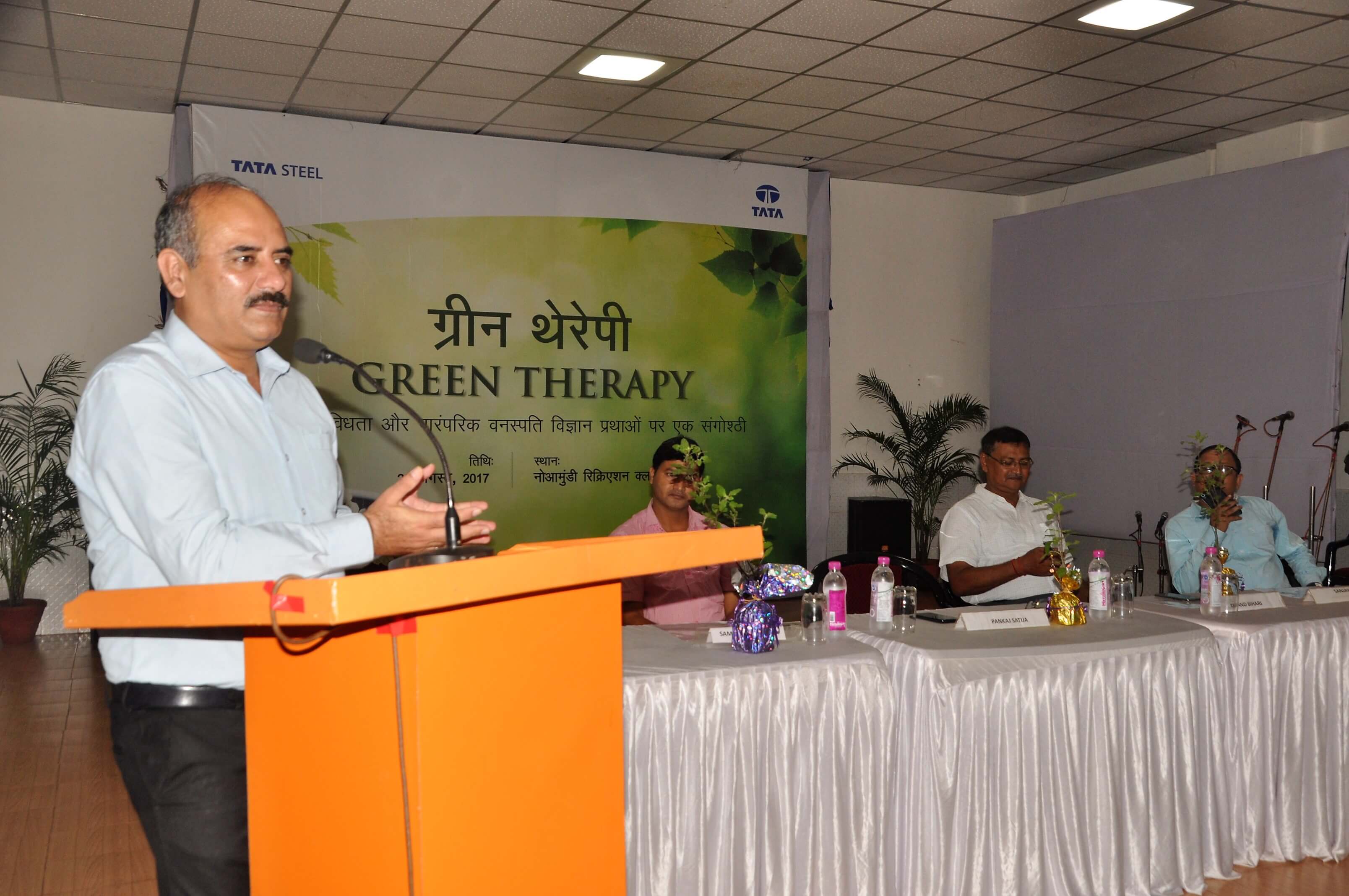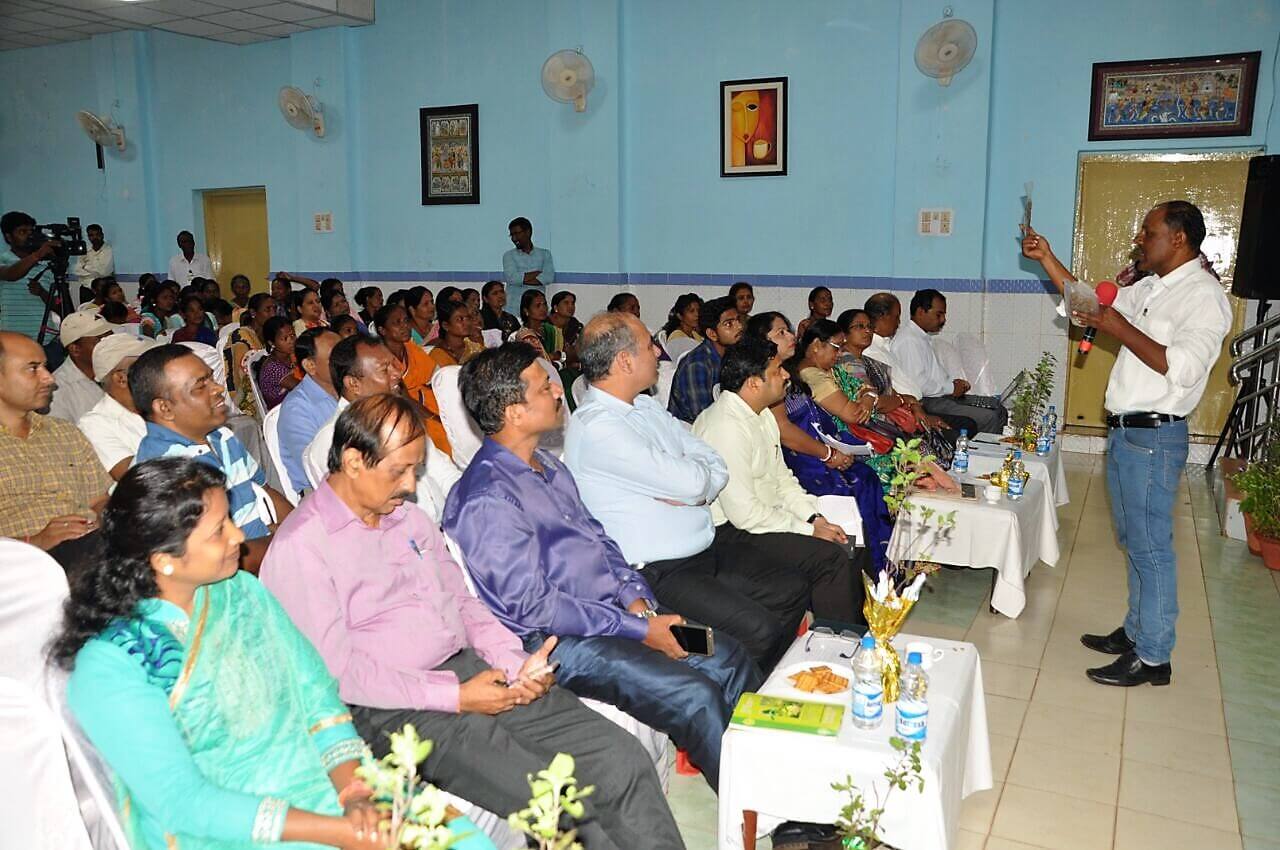Green Therapy seminar at Tata Steel Noamundi focuses on biodiversity and ethnobotanical traditions

In conscious efforts to bring the traditional ethnobotanical medicinal practices to the mainstream medicinal realm, Tata Steel organised the second edition of Green Therapy today at Noamundi Recreation Club.
Green Therapy focuses on biodiversity and ethnobotanical traditions and is a platform to create opportunities of learning through knowledge sharing sessions, efficient utilization and nurturing of plants with medicinal value and promote tribal culture. The emphasis this year was to understand the marketing dynamics of the products made from medicinal plants, prepared with scientific aid.
Ms Laxmi Soren , Member, Zila Parishad, West Singhbhum graced the occasion as chief guest.
Mr Pankaj Satija, General Manager (Ore Mines & Quarries) Division, Tata Steel in his welcome speech said : "The Hibiscus Park at Noamundi is an outcome of last year’s Green Therapy brainstorming and I am confident that the second edition will be even more fruitful.
Addressing the gathering, Ms Soren said :"Living close to nature not only helps us to stay healthy but also heals us in its own ways. I applaud the efforts taken by Tata Steel to preserve and promote biodiversity in the region.

Experts from Maharashtra, Odisha and Jamshedpur participated and presented their research work. The expert session was synchronized with the expertise of indigenous ethnobotanical practitioners of the region. During the technical session, Mr Gajanand Kale, Founder and Director of Dream, an NGO from Maharashtra explained about the marketing techniques to promote tribal medicines.
Other important researchers in the technical session included Dr. Vinodk K, Arogya Bhavan, Jamshedpur, Mr Harmohan Maharatha, Odisha Forest Service, State Medicinal Plant Board, Odisha, Mrs Mamta Biswal, Floral and Biodiversity Conservation NGO member, Sushrusha, Bhubaneswar, Odisha, Dr Arun Kumar Dash, Former Head of the Department, Odisha University of Agriculture and Technology, Bhubaneswar Dr Sunil Kumar Behra, Ayruvedic medicine specialist.
Mr Anand Bihari, Forest Range Officer, Noamundi, Mr Samresh Bhandari, Block Development Officer, Noamundi, and Mr Sanjay Das, General Secretary, Noamundi Mazdoor Union along with members from Tata Steel Rural Development Society were presented on the occasion. A total of 200 people including Manki’s, Munda’s and local Vaidyas from in and around Noamundi participated in the event.
About Tata Steel
Tata Steel Group is among the top global steel companies with an annual crude steel capacity of 27.5 million tonnes per annum (MTPA) as on March 31, 2017. It is the world's second-most geographically-diversified steel producer, with operations in 26 countries and a commercial presence in over 50 countries. The Group recorded a consolidated turnover of US $18.12 billion (INR 117,420 crore) in FY17. Tata Steel Group is spread across five continents with an employee base of nearly 74,000. Having bagged the Deming Application Prize and Deming Grand Prize for continuous improvement in 2008 and 2012 respectively, Tata Steel has now been recognised as the global ‘Industry Leader’ in ‘Steel category’ by Dow Jones Sustainability Index (2015). Besides being a member of the World Steel Climate Action Programme, Tata Steel has also been felicitated with several awards including the Prime Minister’s Trophy for the best performing integrated steel plant for 2013-14 (received in 2017), Best Risk Management by CNBC TV18 (2016), ‘Best-in-class Manufacturing’ award from TIME India (2016) and the ‘Most Ethical Company’ award from the Ethisphere Institute (2016), IIM Sustainability Award (2015), among several others.
Disclaimer
Statements in this press release describing the Company’s performance may be “forward looking statements” within the meaning of applicable securities laws and regulations. Actual results may differ materially from those directly or indirectly expressed, inferred or implied. Important factors that could make a difference to the Company’s operations include, among others, economic conditions affecting demand/ supply and price conditions in the domestic and overseas markets in which the Company operates, changes in or due to the environment, Government regulations, laws, statutes, judicial pronouncements and/ or other incidental factors.









